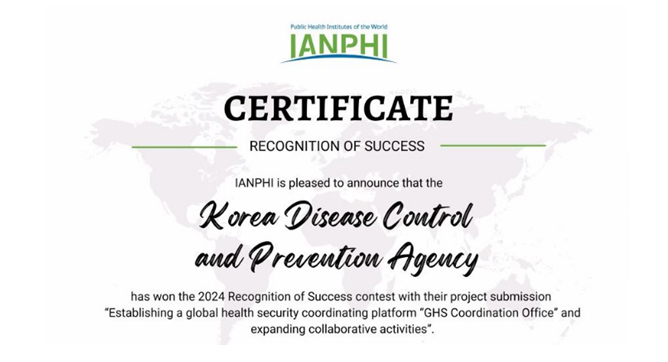
GHSCO Newsletter
March 2025
Volume2 Number1
GHSCO Updates
GHSCO Activity Plan:
Achievements in 2024 & Strategic Direction for 2025
Since its launch in December 2023, the Global Health Security Coordination Office (GHSCO) has actively worked to establish its presence in the international community. With a focus on strengthening global health capacities, GHSCO has developed International Development Cooperation (IDC) including Official Development Assistance (ODA) projects and invited training programs leveraging the Korea Disease Control and Prevention Agency’s (KDCA) expertise.
Key Achievements in 2024
Capacity-Building Initiatives
GHSCO made significant progress in 2024 through various capacity-building initiatives. The office successfully conducted the ASEAN Core Personnel Training Program twice, enhancing laboratory diagnostics and analysis capacities across ASEAN countries. Additionally, it implemented IDC including ODA projects in Lao PDR and Mongolia to support the establishment of laboratory surveillance systems. To further strengthen epidemiological capacity, GHSCO supported training and education for the Field Epidemiology Training Program (FETP).
Global and National Engagement
On the global and national stages, GHSCO has made significant efforts to demonstrate our commitment to improving global health security. To figure public health related needs of embassies and foreign nationals in Korea, GHSCO bolstered networks among the embassies to enhance international cooperation. The Office also actively participated in Global Health Security Agenda (GHSA) activities. At the Global Health Security Conference held in Australia on June, 2024, GHSCO organized a side event, where it shared with partner organizations best practices and discussed direction toward strengthening global health security.
Recognition
In recognition of its contributions, the "Establishing GHS Coordination Office" project was selected as the 2024 IANPHI Asia Network Success case at the International Association of National Public Health Institutes (IANPHI) General Assembly on December 11, 2024.
 Recognized as an "IANPHI Asia Network Success"
Recognized as an "IANPHI Asia Network Success"
December 11, 2024
Summary of 2024 Activities
- Initiated the ASEAN Core Personnel Training Program
- Conducted IDC including ODA projects (Laos, Mongolia, etc.)
- Organized a side event at the GHS Conference
- Built a network of embassies in Korea
- Participated in GHSA Steering Group meetings
- Published the GHSCO newsletter quarterly
- Recognized as an "IANPHI Asia Network Success"
Strategic Direction for 2025
Expansion of Training Programs and Cooperative Projects
Building on its achievements, GHSCO aims to expand its efforts in 2025 to lead and further strengthen global capacity-building initiatives. The ASEAN Core Personnel Training Program will be broadened to provide more in-depth education in laboratory diagnosis and analysis. Furthermore, new training programs in epidemiology and surveillance will be developed and implemented based on the specific needs of ASEAN countries. IDC projects will continue, with a focus on Laos and Mongolia, incorporating simulation exercises to assess and improve infectious disease preparedness and response capacity.
Participation in Global Health Security Assessments
GHSCO will also play a crucial role in global health security assessments by supporting the second round of Joint External Evaluation (JEE) to assess KDCA’s implementation of the International Health Regulations (IHR). Furthermore, it will actively participate in the WHO JEE evaluation team and contribute to the Global Outbreak Alert and Response Network (GOARN) activities.
Enhanced Communication and Outreach
To enhance communication and outreach, GHSCO will launch its official website, improving engagement with both national and global partners. The quarterly GHSCO newsletter will continue to provide updates on ongoing activities and key initiatives, ensuring stakeholders remain informed and engaged.
Planned Activities for 2025
- Expand the ASEAN Core Personnel Training Program
- Continue IDC including ODA projects
- Participate in the WHO JEE evaluation team and strengthen WHO GOARN activities
- Launch an official GHSCO website to diversify communication channels